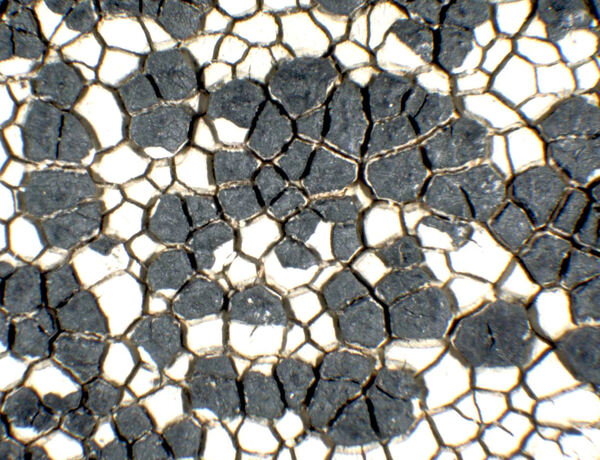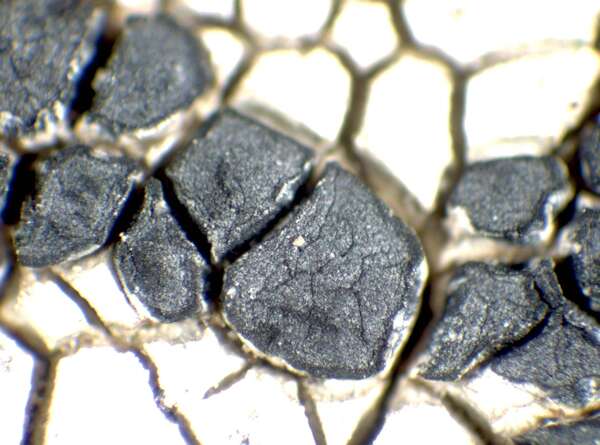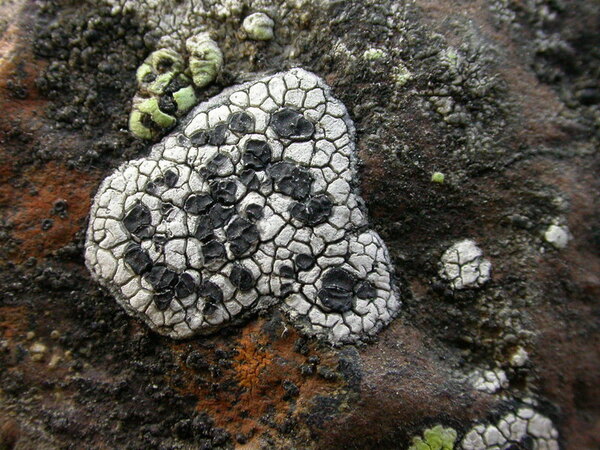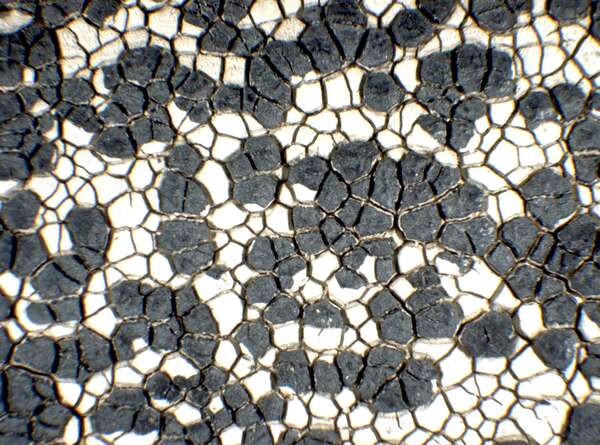Lecidea tessellata Flörke var. tessellata
Deutsch. Lich.: 64, 1819.
Synonyms: Lecidea cyanea sensu Th. Fr. non (Ach.) Röhl.; Lecidea homalodes Nyl.; Lecidea magna Lynge; Lecidea occidentalis Lynge; Lecidea spilota Fr.; Lecidea spilota var. intricata (Hepp) Anzi?; Lecidella spilota (Fr.) Körb.
Description: Thallus crustose, episubstratic, greyish white to pale bluish grey, sometimes spottily rust-red on iron-containing rocks, 0.2-2(-3) mm thick, thicker in central parts, forming small patches, often delimited by a dark prothallus, finely rimose-areolate, the areoles contiguous, flat to slightly convex. Cortex 10-17 µm thick; medulla thick, white, I+ deep blue. Apothecia lecideine, black, adpressed, mostly developed between the areoles, usually clustered, rounded to usually angular in outline, 0.3-2(-3) mm across, with a black, epruinose or weakly pruinose, flat to very slightly convex disc and a thin, often soon excluded proper margin. Proper exciple poorly developed, with a brownish rim, colourless within; epithecium olive-brown, grey or green-black, 10-15 µm high; hymenium colourless or pale green, 40-80 µm high, I+ blue; paraphyses simple or rarely sparingly branched, usually not anastomosing, 1.8-2.7 µm thick at mid-level, the apical cell 3.5-6 µm wide; hypothecium colourless to pale brown. Asci 8-spored, clavate, Lecidea-type. Ascospores 1-celled, hyaline, ellipsoid to broadly ellipsoid, (6-)7.5-11(-13) x 3.5-7 µm, not halonate, rather thick-walled. Pycnidia semi-immersed, black, the ostiolar region often elongate and almost lirelliform. Conidia bacilliform, 7-19 x 1-1.5 µm. Photobiont chlorococcoid. Spot tests: thallus K-, C-, KC-, P-. Chemistry: confluentic acid (major), 2’-0-methylperlatolic acid.
Growth form: Crustose
Substrata: rocks
Photobiont: green algae other than Trentepohlia
Reproductive strategy: mainly sexual
paras crustose lichens
Commonnes-rarity: (info)
Alpine belt: extremely common
Subalpine belt: common
Montane belt: rare
Dry submediterranean belt: absent
Humid submediterranean belt: absent
Padanian area: absent
pH of the substrata:
1 2 3 4 5
Solar irradiation:
1 2 3 4 5
Aridity:
1 2 3 4 5
Eutrophication:
1 2 3 4 5
Poleotolerance:
0 1 2 3
Altitudinal distribution:
1 2 3 4 5 6
Rarity
absent
extremely rare
very rare
rare
rather rare
rather common
common
very common
extremely common
Loading data...
Occurrence data
Predictive map
Growth form: Crustose
Substrata: rocks
Photobiont: green algae other than Trentepohlia
Reproductive strategy: mainly sexual
paras crustose lichens
Commonnes-rarity: (info)
Alpine belt: extremely common
Subalpine belt: common
Montane belt: rare
Dry submediterranean belt: absent
Humid submediterranean belt: absent
Padanian area: absent
pH of the substrata:
| 1 | 2 | 3 | 4 | 5 |
Solar irradiation:
| 1 | 2 | 3 | 4 | 5 |
Aridity:
| 1 | 2 | 3 | 4 | 5 |
Eutrophication:
| 1 | 2 | 3 | 4 | 5 |
Poleotolerance:
| 0 | 1 | 2 | 3 |
Altitudinal distribution:
| 1 | 2 | 3 | 4 | 5 | 6 |
Rarity
absent
extremely rare
very rare
rare
rather rare
rather common
common
very common
extremely common
Loading data...
Occurrence data
Predictive map










